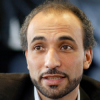Tariq Ramadan

Tariq Ramadan
Tariq Ramadanis a Swiss academic, philosopher and writer. He is the professor of Contemporary Islamic Studies in the Faculty of Oriental Studies at St Antony's College, Oxford and also teaches at the Oxford Faculty of Theology. He is a visiting professor at the Faculty of Islamic Studies, the Université Mundiapolisand several other universities around world. He is also a senior research fellow at Doshisha University. He is the director of the Research Centre of Islamic Legislation and Ethics, based in...
NationalitySwiss
ProfessionWriter
Date of Birth26 August 1962
CountrySwitzerland
Many U.S. organizations believe that I am being barred from the country not because of my actions but because of my ideas. The conclusion seems inescapable.
I've never suffered because of my heritage in Europe.
We all cherish freedom of speech, but with a reasonable approach and a reasonable use of it. If we come to this, it is a debate. If not, then it is a power struggle. Who is going to win, the Muslim principles or the Western principles?
We've got to get away from the idea that scholars in the Islamic world can do our thinking for us. We need to start thinking for ourselves.
A good Muslim is not one who is strictest in his judgment, but who is most patient in listening.
I think many thinkers and activists, even in the Islamist parties like the Muslim Brotherhood, and the people who left the Muslim Brotherhood to follow Abou el-Fatouh, these people do have an understanding that the relationship between religion and the state must be re-thought and re-assessed. They're not going to use the concept of secularism in any straightforward way, because the concept of secularism is still far too loaded in that part of the world.
To be kind is good. To be kind without expecting anything in return is better.
Fear is created which can lead to racism. However, we can overcome that fear through trust.
Saying that I am talking out of both sides of my mouth just proves my very point. Politicians would bypass real social issues by referring to my grandfather, who founded the Muslim Brotherhood, or to my brother, currently chairman of the Islamic Centre in Geneva.
The more you look into and understand yourself, the less judgmental you become towards others.
I don't like what you`re doing, but I won't insult you. Why? Because who you are tomorrow may be better than who I am today
When I go back to the Quran I see that the context of Revelation is creation in its entirety. The universe is a Revelation and this of course includes nature, plants and animals. In other words, what is coming from the Quran as rules and objectives are set within the larger scheme of the universe and nature as part of Creation.
Islam doesn't need reform, we need to reform the Muslim mind.
Humility is my table, respect is my garment, empathy is my food and curiosity is my drink. As for love, it has a thousand names and is by my side at every window.